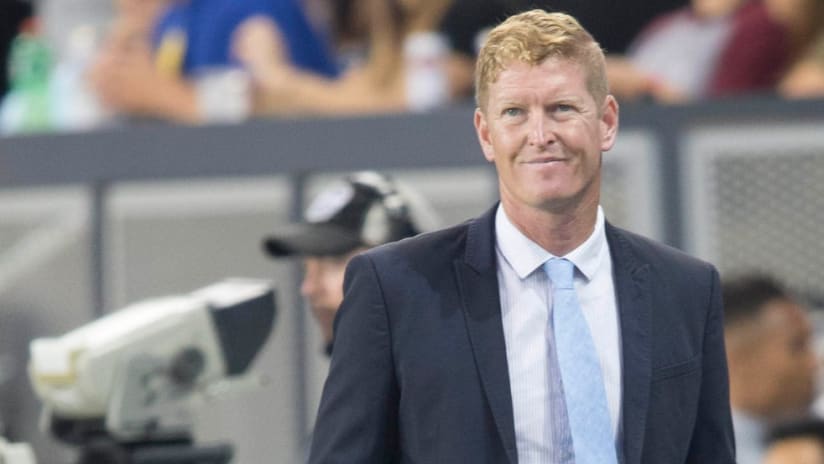Thanks to modern technology, Jim Curtin and his Philadelphia Union side are spending plenty of time together these days despite the separation imposed by the COVID-19 pandemic.
There’s one-on-one sessions, positional groups, film analysis and occasionally even a full-team roundup, although those are rarer; as Curtin notes, “when you have 40 people on a Zoom call it can get a little chaotic.”
The seventh-year head coach’s favorite gatherings, however, still happen in person. They're the only ones he gets to have face-to-face these days: seeing his three children (Miles, age 8, Avery, 9 and Ryan, 12) arrive at the breakfast table every morning.
“[In normal times], I'm usually gone by the time they wake up in the morning,” Curtin told MLSsoccer.com this week. “The part that doesn't feel normal to me is being here — hanging out in the living room or the kitchen and having them trickle down one by one.
“My youngest is usually up first, around 7:30 or so, and then probably 8, 8:15 for my next, my youngest daughter. And then the oldest is 12, she can still sleep till 10:00. So they matriculate out of bed and kind of start the routine of the day. Being here for that is maybe a little thing, but it's a big one for me because I don't usually get to experience it.”
Like millions of others across North America and around the world, Curtin and his wife Jen are trying to make the best of this challenging and unprecedented situation, seeking some semblance of normalcy for their kids without losing perspective on the historic nature of it all.
“I think all families get used to their routines and rhythms,” he said. “Most of the time it revolves around school, work, extracurricular activities and sports they're involved in. Since the outbreak of the virus it's really caused us to break that rhythm and kind of find a new one … it certainly gives you a newfound appreciation for the work that the teachers do day in and day out, that's for sure.”
The Curtins, who live in the Queen Village district near Philly’s Center City, focus on school work in the morning — Jim admits that the newer teaching methods in their mathematics courses have been a challenge for him — and try to get outside at least once a day for walks, bike rides and the like. They play board games or watch movies in the evenings, including some older flicks from Mom and Dad’s youth that have earned, shall we say, mixed reviews.
“I’m throwing some of the old-school movies at them and what holds up and what doesn’t is kind of a crapshoot,” said Curtin with a laugh, “but I was happy they got a kick out of ‘The Naked Gun,’ so that one still holds up. Some others didn’t, that’s for sure … ‘Spaceballs’ was a total bomb. And the more I thought about it as it was on, it really is stupid, as much as I loved it at the time.”
His older daughter Ryan is now old enough to go jogging with him, which despite being a reality check for his own aging process, gives them moments of quality time. And all three children are processing this strange situation in their own ways.
“You do your best as parents — and I don't want to claim to have all the answers — but you explain the seriousness of what's going on in the outside world and even how other families are being a lot worse affected then we are,” said Curtin. “We do have some families that we’re very close with, people who have gone through the illness, and I think sharing that and explaining that to them is important. I think it’s better than hiding from it.
“You try to explain to them through that they're going through something now — maybe my oldest is the only one who grasps this — but they're going through something now that will be talked about in the history books. As hard as it is to know what that's going to sound like or look like in writing, it certainly is a time that is unique, and they'll be considered strong for going through it.”
One silver lining to all this social distancing, he says, is an increased familiarity with video calling programs that have brought them into more regular contact with extended family. But the closed shops and boarded-up businesses of their neighborhood provide sobering reminders of the crisis’ costs and what’s likely to be its lingering, far-reaching effects. There’s a lesson or two in that as well.
“I don't want to turn into some economist about this,” said Curtin, “but they can see that all the small businesses that shut down, and it's kind of a ghost town.
“When this is over and we do get through this, which we will, there has to be this sense of almost like a hyper-localism to try to build up your own community. So hopefully others can feel that too, just a real value on neighborhood and the difficult time that everybody's gone through, kind of getting them back on their feet. I think one step that we all can take is really support your own local businesses and communities.”













